List of Presidents of the United States with facial hair
The majority of men who have held the office of President of the United States have been clean shaven, including the Founding Fathers.[1] Between 1861 and 1913, however, all but two presidents wore either beards or mustaches during their tenure in office.
John Quincy Adams (1825–29) was the first U.S. President to have notable facial hair, with long sideburns.[2] But the first major departure from the tradition of smooth-faced chief executives was Abraham Lincoln (1861–65),[3][4][5] who was supposedly (and famously) influenced by 11-year-old Grace Bedell to start growing a beard shortly before he was elected.[6][7] After Lincoln, all but two presidents over the next 50 years sported facial hair, the exceptions being Andrew Johnson (1865–69) and William McKinley (1897–1901).[8]
Beards and mustaches fell out of favor due to health reasons, as described on the PBS website pertaining to a documentary on tuberculosis. "Most men at the turn of the century featured stylish beards or mustaches, but showing off a smooth face became a new trend once public health officials maintained that men could transmit dangerous infectious particles through the scruff of their facial hair. An editorial in a 1903 Harper's Weekly stated, "Now that consumption is no longer consumption, but tuberculosis, and is not hereditary but infectious…the theory of science is that the beard is infected with the germs of tuberculosis.” Ultimately, the clean-shaven look became a symbol of the new middle-class man during the period that Harper's Weekly labeled "the revolt against the whisker.""
The most recent president to have facial hair was William Howard Taft (1909–1913), who wore a mustache.[9][10][11][12][13] The last major party candidate to wear a beard was Charles Evans Hughes, who was defeated in 1916.[14] The last major party candidate for President to have facial hair was Thomas E. Dewey, who had a mustache, in 1944 and 1948.[15][16] Some pundits even claimed that public disapproval of Dewey's mustache may have contributed to his two electoral defeats.[17][18][19][20]
Social scientists have researched the effect of facial hair on the electability of Presidential candidates, and currently consider facial hair to have a negative effect on candidates.[10][21][22] Today, the existence of facial hair on potential presidential candidates is regularly noted (albeit somewhat jokingly) as a harmful factor.[23][24]
Following is a list of American presidents who had facial hair at any time during their tenure.[25]
List
| No. | Portrait | Name (Birth–death) |
Years served |
Political party |
Beard | Moustache | Sideburns | Color |
|---|---|---|---|---|---|---|---|---|
| 6 |  |
Adams, John QuincyJohn Quincy Adams (1767–1848) |
1825–1829 | Democratic-Republican | No | No | Yes | Dark Brown |
| 8 | 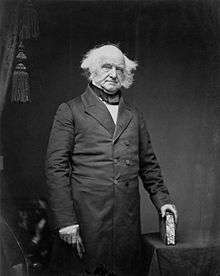 |
Van Buren, MartinMartin Van Buren (1782–1862) |
1837–1841 | Democratic | No | No | Yes | White |
| 12 |  |
Taylor, ZacharyZachary Taylor (1784–1850) |
1849–1850 | Whig | No | No | Yes | Gray |
| 16 |  |
Lincoln, AbrahamAbraham Lincoln (1809–1865) |
1861–1865 | Republican | Yes | No | N/A | Black |
| 18 | 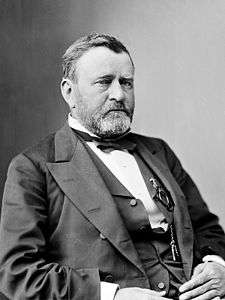 |
Grant, Ulysses S.Ulysses S. Grant (1822–1885) |
1869–1877 | Republican | Yes | Yes | N/A | Brown |
| 19 | 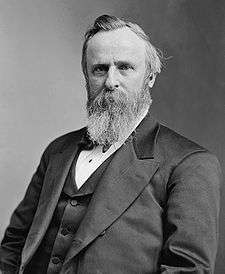 |
Hayes, Rutherford B.Rutherford B. Hayes (1822–1893) |
1877–1881 | Republican | Yes | Yes | N/A | Black |
| 20 | 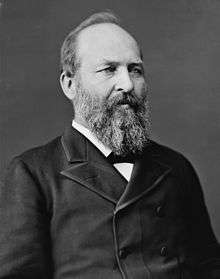 |
Garfield, James A.James A. Garfield (1831–1881) |
1881 | Republican | Yes | Yes | N/A | Light Brown |
| 21 | 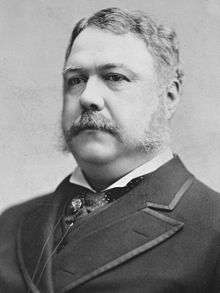 |
Arthur, Chester A.Chester A. Arthur (1829–1886) |
1881–1885 | Republican | No | Yes | Yes | Brown[26] |
| 22 & 24 | 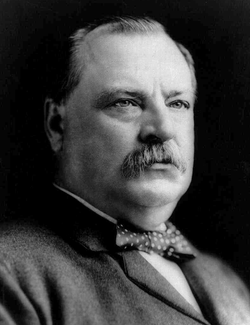 |
Cleveland, GroverGrover Cleveland (1837–1908) |
1885–1889 1893–1897 |
Democratic | No | Yes | No | Brown |
| 23 | 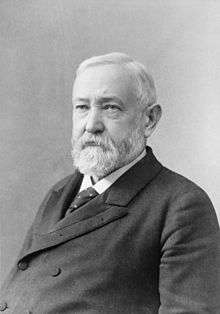 |
Harrison, BenjaminBenjamin Harrison (1833–1901) |
1889–1893 | Republican | Yes | Yes | N/A | Brown |
| 26 | 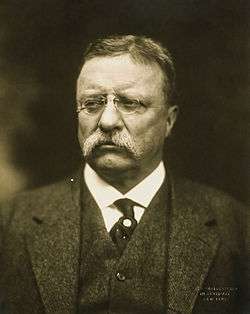 |
Roosevelt, TheodoreTheodore Roosevelt (1858–1919) |
1901–1909 | Republican | No | Yes | No | Brown |
| 27 | 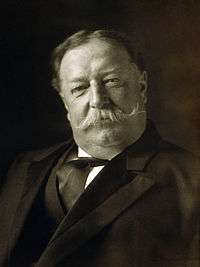 |
Taft, William HowardWilliam Howard Taft (1857–1930) |
1909–1913 | Republican | No | Yes | No | Brown |
References
- ↑ Hoogenboom, Ari. What Really Caused The Civil War?, Wisconsin Magazine of History (1960) ("The founding fathers were without beards, as were all Presidents from Washington to Buchanan.")
- ↑ Most Presidents Have Favored Beardless Look, Star-Banner (Associated Press), August 27, 1986
- ↑ Brus, Michael.Beards, Slate (magazine), August 9, 2001
- ↑ Whiskers in History, Chicago Tribune, May 27, 1888 ("Thirty Years Ago a Bearded Man in the United States Was an Exception – The Fathers of the Republic Were Smooth Shaven – All Republican Candidates and Presidents Have Worn Full Beards, While No Democrat Has Yet Been Able to Display More than a Mustache")
- ↑ Presidential Whiskers, Atlanta Constitution, January 7, 1892
- ↑ Kansas Honors Girl Who Urged Lincoln To Grow Whiskers, The New York Times, August 9, 1966
- ↑ Shapiro, Ben. Project President: Bad Hair and Botox on the Road to the White House, ch. 6 (2008) (ISBN 978-1595551009)
- ↑ Best presidential criterion: Hair, USA Today, October 10, 1996
- ↑ Paxson, Peyton, Media literacy: thinking critically about visual culture, p.91 (2004)(ISBN 978-0825149917)
- 1 2 Herrick, Rebekah, Mendez, Jeanette and Pryor, Ben, Razors Edge: The Politics of Facial Hair (2010). APSA 2010 Annual Meeting Paper ("Although between Lincoln and Taft all but two presidents had facial hair, Pres. Taft was the last President to have facial hair. In Congress at the beginning of the 110th Congress less than 5% of Congressmen had facial hair. Interestingly this decline occurred as women got the right to vote. This paper explores whether there could be a connection.")
- ↑ About Whiskers, Los Angeles Times, June 18, 1916 ("The fact that Presidential Candidate Hughes, and his running mate on the Republican ticket, Mr. Fairbanks, have whiskers has been much commented on the last day or two, and will be likely to cause much...")
- ↑ Whiskers and Presidency: Kern The Only Democratic Aspirant Who Wears Full Beard, The Baltimore Sun, January 25, 1912
- ↑ Locke, Walter. Time for a Turn in the Whisker Cycle, The Miami News, March 1, 1949
- ↑ Will campaign be decided by a close shave?, The San Diego Union-Tribune, September 23, 2004
- ↑ Facial Hair Unacceptable for Presidential Politics, Reading Eagle (Knight Ridder), November 2, 1996
- ↑ Efron, Edith. Saga of the Mustache, The New York Times, August 20, 1944
- ↑ Grimsley, Edward. Victory is under the candidate's nose, Richmond Times-Dispatch, November 15, 1991 ("Pundits attributed Dewey's defeats partly to public disapproval of his mustache.")
- ↑ Montgomery, M.R. Dewey's Facial Flaw, The Boston Globe, November 7, 1986 ("Thomas E. Dewey had a mustache, which was one of the reasons he did not get elected president.")
- ↑ A Beard for Nixon? The Matter Raises White House Eyebrows, Los Angeles Times, April 29, 1971
- ↑ Olin, Dirk. In Politics, the Mustache Is the Kiss of Death, Los Angeles Times, October 31, 1988
- ↑ Armstrong, J. Scott & Graefe, Andreas. Predicting Elections from Biographical Information About Candidates: A Test of the Index Method (March 1, 2010). Journal of Business Research (Forthcoming) ("Given that most politicians, especially in recent years (note that William Taft was the last U.S. president with facial hair), are clean shaved, facial hair is expected to have a negative effect on the evaluation of candidates.")
- ↑ Whiskers in Politics, The Boston Globe, May 22, 1896 ("An enterprising student of politics has been pursuing a line of research designed to show the relation of whiskers to successful presidential candidacies.")
- ↑ John Bolton Threatens to Run for President If You Don’t Start Paying Attention to Him, New York (magazine), August 30, 2010 ("The last man with facial hair to be elected president was William Howard Taft, in 1908. That in itself should disqualify John Bolton and his enormous, walruslike mustache from even thinking about running in 2012.")
- ↑ Buchwald, Art. Race or Facial Hair?, Southeast Missourian, April 9, 1984 (satirical article noting Jesse Jackson's mustache as a negative factor in the 1984 Democratic primary contests)
- ↑ Allan D. Peterkin, One thousand beards: a cultural history of facial hair, pp. 36–37
- ↑ http://www.presidential-power.org/pictures-of-presidents/picture-chester-arthur.htm
External links
- Heads of State (February 14, 2010 New York Times graphic of all presidential hairstyles including facial hair)